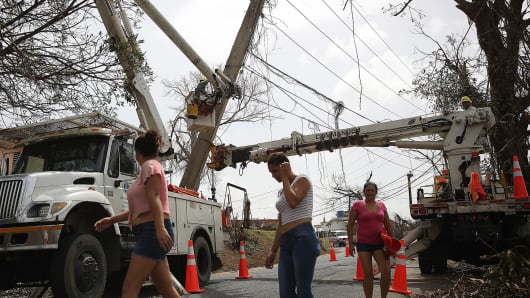Release date:
November 27, 2017
Release Number:
DR-4339-PR NR 060
SAN JUAN, Puerto Rico – As Puerto Rico begins to transition from the response phase to recovery, Michael Byrne, the Federal Coordinating Officer (FCO) for Puerto Rico has been named as the Federal Disaster Recovery Coordinator (FDRC). Byrne has more than 30 years of experience in disaster management and recovery program execution, including serving as the FDRC for Hurricane Harvey in Texas, and the FCO for Hurricane Sandy in New York and the 2011 Alabama tornadoes.
As the FDRC and FCO, Byrne will work closely with the government of Puerto Rico and federal response leadership to facilitate disaster recovery coordination and collaboration between Puerto Rico, federal and municipal governments, private sector entities, and voluntary, faith-based and community organizations.
Due to the complex recovery challenges of Hurricane Maria, the federal government will leverage all available resources in support of Puerto Rico’s recovery efforts. Areas of focus will include:
- Housing, coordinated by the U.S. Department of Housing and Urban Development (HUD), to develop adequate, affordable, and accessible housing solutions for Hurricane Maria survivors.
- Infrastructure Systems, coordinated by the U.S. Army Corps of Engineers, to efficiently facilitate the restoration of infrastructure systems and services to support viable, sustainable communities and improve resilience to, and protection from, future hazards.
- Economic Recovery, coordinated by the U.S. Department of Commerce, to assist with sustaining or restoring businesses and employment in the affected area, and developing economic opportunities in these communities.
- Health and Social Services, led by the U.S. Department of Health and Human Services, to support locally led recovery efforts to address public health, health care facilities and coalitions, and essential human services.
- Natural and Cultural Resources, led by the Department of Interior, will work with communities wishing to preserve, protect and restore natural and cultural resources—such as historic structures—during recovery; and
- Community Planning and Capacity Building, coordinated by FEMA, to facilitate support among a variety of partners for the planning, capacity, and resilience building capabilities needed by local or tribal governments following this disaster.
These lead federal agencies will work with other supporting agencies for long term recovery with a singular focus of restoring functional and resilient communities and local economies.
The federal government continues to be focused on protecting the lives and safety of those in affected areas after Hurricane Maria. For more information about FEMA, the federal response, and resources available for disaster survivors, please visit https://www.fema.gov/hurricane-maria.
###
FEMA’s mission is to support our citizens and first responders to ensure that as a nation we work together to build, sustain, and improve our capability to prepare for, protect against, respond to, recover from, and mitigate all hazards.
Disaster recovery assistance is available without regard to race, color, religion, nationality, sex, age, disability, English proficiency or economic status. If you or someone you know has been discriminated against, call FEMA toll-free at 800-621-3362 (voice, 711/VRS - Video Relay Service.) Multilingual operators are available. (Press 2 for Spanish). TTY call800-462-7585
The SBA is the federal government’s primary source of money for the long-term rebuilding of disaster-damaged property. SBA helps businesses of all sizes, private non-profit organizations, homeowners and renters, which can cover the cost of replacing lost or disaster-damaged real estate and personal property. These disaster loans cover losses not fully compensated by insurance or other recoveries and do not duplicate benefits of other agencies or organizations.
Join the conversation with FEMA on social media. Follow us at: www.fema.gov/hurricane-maria www.facebook.com/femapuertorico www.twitter.com/femaregion2. Get Hurricane Maria recovery information sent to your phone: text MARIA to 43362.
Get updated information and help us tell your story. The social media links provided are for reference only. FEMA does not endorse any non-government websites, companies or applications.
Last Updated:
November 27, 2017 - 14:34
State/Tribal Government or Region:
Puerto Rico Begins the Transition from Response to Recovery








